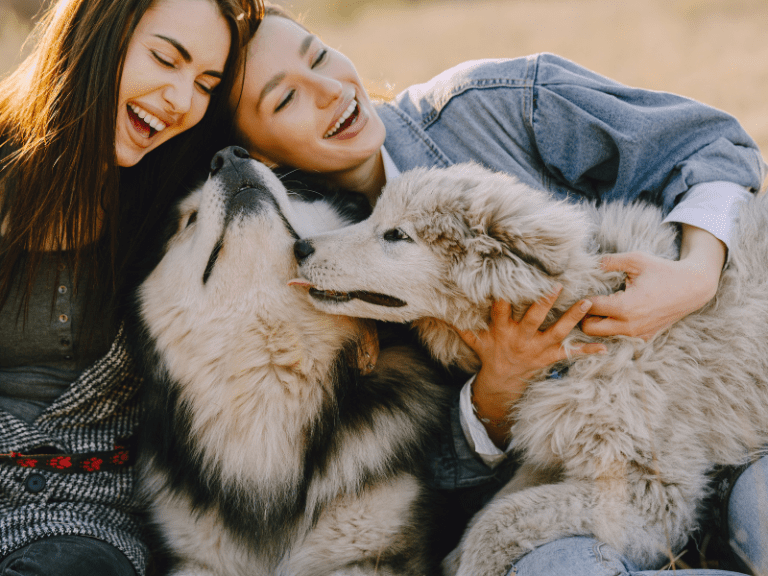Surviving Winter Time: Essential Care Tips for Keeping Your Dog Warm and Safe
FULL DISCLOSURE: The links I share in this course ARE my affiliate links. This means I earn a commission, at no extra cost to you. In fact, sometimes you’ll get a discount or free credits just FOR using my link. 🙂
Winter time can be a magical time of year for many of us, but it can also be challenging for our furry friends. Dogs, just like humans, can experience discomfort and health issues during the cold winter months.
Getting Your Dog Ready for the Winter Time
First and foremost, it's important to make sure that your dog is properly insulated from the cold. This means ensuring they have a warm and dry place to sleep and providing them with a coat or sweater to wear when going outside.
Keeping Your Dog Insulated During the Winter Time
Here are some tips for keeping your dog insulated:
- Provide a warm and dry place to sleep: Make sure your dog has a warm and cozy place to sleep, such as a dog bed with a thick blanket or a heated pad. This will help them stay warm and comfortable when they're resting.
- Dress them in a coat or sweater: Just like humans, dogs can benefit from extra layers of clothing during the winter time. A coat or sweater can provide additional insulation and help keep your dog warm when they're outside.
- Limit time outside in extreme weather conditions: Pay attention to the temperature and weather conditions, and limit your dog's time outside if it's too cold or snowy.
- Keep your dog active: Regular exercise will help keep your dog warm, so make sure to take them for regular walks or playtime, even when it's cold out.
- Regular grooming: Long-haired dogs will benefit from regular grooming to remove matting and tangles, which can affect the insulation of their coat and make them uncomfortable.
By taking these steps, you can help ensure that your dog is properly insulated from the cold during the winter months and stay healthy and happy.
Limit Your Dog's Outside Time During the Winter Time

Paying attention to the temperature and weather conditions will help you to know when it is too cold outside for your dog. This can help prevent hypothermia and frostbite in dogs, which can be serious and even life-threatening.
At What Temperature Should I Limit My Dog's Outside Time?
In general, it's best to limit your dog's time outside when the temperature drops below freezing or when there is a high wind chill or heavy snowfall. If your dog does need to be outside for an extended period, make sure they have proper insulation in the form of a warm coat or sweater and a dry and warm place to rest.
Watch For Signs of Hypothermia and Frostbite
It's also important to be aware of the signs of hypothermia and frostbite in dogs, which can include shivering, lethargy, confusion, and discoloration of the skin. If you notice any of these signs, bring your dog inside immediately and contact your veterinarian.
Remember that some dogs are more susceptible to cold weather than others, particularly small dogs, short-haired dogs, and older or sick dogs. So, it is important to pay extra attention to these dogs and to limit their time outside in cold weather.
Snow and Ice Accumulation During the Winter Time

Another important consideration during the winter is the potential for snow and ice to accumulate on your dog's paws. This can lead to discomfort and even injury, so it's important to keep your dog's paws trimmed and wipe them off with a warm towel after a walk in the snow. You can also invest in dog booties to protect their paws from the cold and ice.
Tips to Prevent Snow and Ice Accumulation
To prevent snow and ice from accumulating on your dog's paws, you can do the following:
- Keep their paws trimmed: Regularly trimming your dog's nails will help prevent snow and ice from getting trapped in between their toes.
- Use paw balm or wax: Applying paw balm or wax to your dog's paws before going outside can help protect them from the cold and ice.
- Wipe their paws off after a walk: After a walk in the snow or ice, wipe your dog's paws off with a warm towel to remove any accumulated snow or ice.
- Invest in dog booties: Dog booties can provide extra protection for your dog's paws and help keep them from getting too cold.
- Limit the time outside: If the conditions are extremely cold, icy, or snowy, it's best to limit your dog's time outside.
Taking these steps can help prevent snow and ice from accumulating on your dog's paws and keep them comfortable and healthy during the winter months.
During the Winter Time, Dogs Can Become Depressed
In addition to these physical concerns, it's also important to be aware of the potential for winter time boredom and depression in dogs. Just like humans, dogs can become bored and lonely when cooped up inside for extended periods. To combat this, make sure to spend plenty of quality time with your dog and provide them with plenty of mental and physical stimulation.
Preventing Winter Time Boredom
To prevent winter time boredom and depression in your dog, it's important to provide them with plenty of mental and physical stimulation. This can include things like:
- Regular exercise: Make sure to take your dog for regular walks and playtime, even when it's cold outside. This will help them stay physically fit and mentally stimulated.
- Training and obedience: Engage in regular training and obedience exercises to keep your dog's mind active and focused.
- Interactive toys: Provide your dog with interactive toys, such as puzzle feeders, to keep them mentally stimulated when alone.
- Socialization: Provide your dog opportunities to socialize with other dogs and people, even if it's just a quick visit to the dog park or a playdate with a friend's dog.
- Quality time: Make sure to spend plenty of quality time with your dog, whether cuddling on the couch or playing a game of fetch.
Providing your dog with plenty of mental and physical stimulation can help prevent winter time boredom and depression and ensure they stay happy and healthy during the colder months.
Caring For Your Dog During the Winter Time
Overall, taking the time to properly care for your dog during the winter months is essential for their health and happiness. With extra attention and care, you can help ensure that your furry friend stays warm, comfortable, and healthy all winter long.







